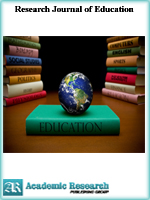Research Journal of Education
Online ISSN: 2413-0540
Print ISSN: 2413-8886
Print ISSN: 2413-8886
Quarterly Published (4 Issues Per Year)

Archives
Volume 3 Number 6 June 2017
The Design Knowledge of Art Forms in Agbeliza of the Avenorpedo People
Authors: Agbeyewornu Kofi Kemevor
Pages: 56-61
Abstract
Festival is considered as one of the key ingredients in culture development. This means that in an effort for a community to meet its cultural growth agenda, attention should be a place of the festival activity. This study is on the design of festivals and the knowledge about artforms in Agbeliza of Avenorpedo. The main objective is the identification of artistic componentsand understanding the symbolisms as used in the celebration of Agbeliza. Qualitative approach was used to describe the activities of the celebration. A participant observation, interview and questionnaire techniques were used to identify the major artforms. The main artforms showcased in the celebration of the festival were visual and performing arts. The results indicated the following credibility of knowledge of the Agbeliza celebration; 70% identified various art forms but did not understand them, 11.5% identified some and gave their own meanings and, 18.5% could not identify but saw them as something needed to enhance the celebration. It was found that the lack of understanding of the visuals that enhance the celebration of Agbeliza bridges the embarrassment of their cultural heritage. It was recommended that educating citizens and Ghanaians to learn to understand and manage their cultural heritage may provide them with adequate insight to avoid escalating negative feelings. Suggested approaches like, making and using approaches with field and school experiences were the expectations of the study.
Islamic Activities on Students? Learning Achievement in Islamic Education Subject at Senior High School in Indonesia
Authors: Ramli Nur
Pages: 48-55
Abstract
The purpose of this study was to investigate the relations of Islamic activities to the students’ academic achievement in Islamic Education Subject in senior high school in Indonesia. Therefore, the quantitative approach was conducted. The techniques used in collecting the quantitative data were questionnaire. Furthermore, the techniques to analyze the data were descriptive quantitative in which the results of the study are presented in description, table/matrix, and arithmetic formula. The result of the study was assumed that the teachers in senior high school in Indonesia eventually conducted the activities, which are taught by Islam and its correlation to the students’ learning achievement was very positive. In conclusion, Islamic activities give positive correlation to the students’ academic achievements in Islamic Education Subject.



